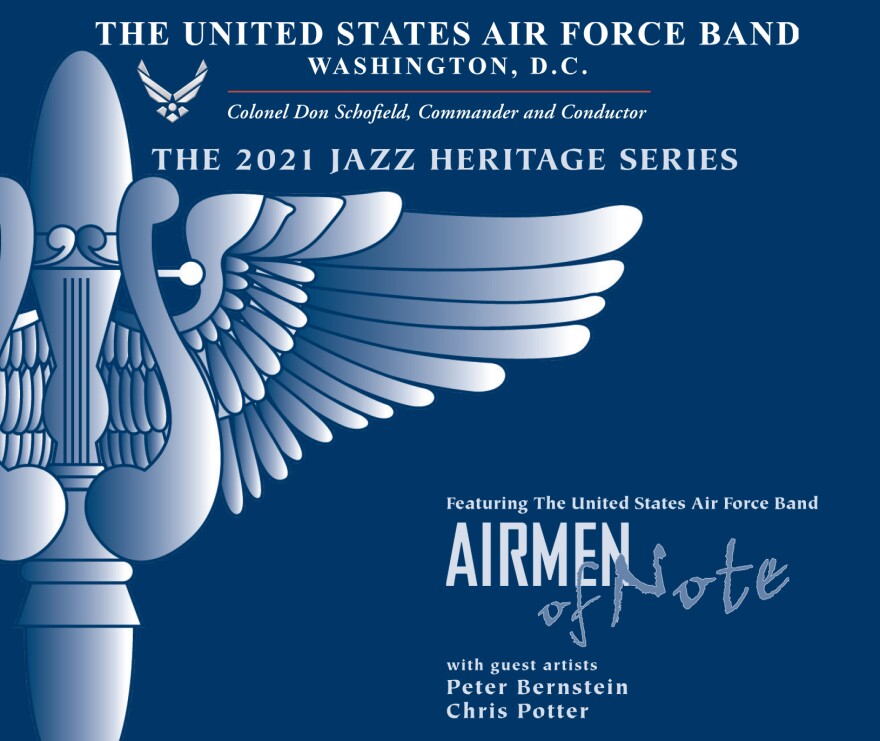May 31, 2021. It takes a lot to ground a squadron of fighter jets when they’ve got a mission to fulfill; the same goes for the Airmen of Note, the United States Air Force Band’s premier jazz ensemble. Especially when they’ve secured featured guests like Peter Bernstein (electric guitar) and Chris Potter (tenor sax).
If you’re a jazz fan, these two are better than any of the high-tech adornments Lockheed Martin might think up next; they are a two-man luxury package made to be displayed, and they come without the sticker shock of the F-35. And so behold the 2021 edition of the Airmen’s Jazz Heritage Series: all the muscle and finesse at a fraction of the cost.
Over 72 minutes, the Airmen present nine tunes. Bernstein plays on the first four; Potter plays on the last five. Bernstein and Potter-penned tunes—all but one arranged by Airmen— make for six of the nine, and the three others are beautiful and beefy standards from Duke Pearson, Rodgers and Hart, and Jule Styne and Sammy Cahn.
Bernstein’s “Means and Ends” leads off his quadruplet of tunes. Apparent immediately, from the head of the tune, is tight and precise unison playing from the rhythm and horn sections, and exceptionally fine work from the Airmen’s bassist, Technical Sgt. (Ret.) Cameron Kayne, who provides ample cover for his lead gunner, Bernstein, while Bernstein solos in that cool yet playful manner of his, even quoting Rodger and Hammerstein’s “Happy Talk” in the midst of his first run.
But as great a soloist as Bernstein is, he’s such an elegant accompanist, a strength he’s credited to mentor Jim Hall. You hear it in each of the first three tunes, and then it’s really showcased on track four, appropriately a Jim Hall arrangement of Rodgers and Hart’s “With a Song in My Heart,” that’s presented as a guitar duet with Bernstein and Senior Master Sgt. Geoff Reecer. The guitarists trade off soloing and comping; in the vein of the Joe Pass/Herb Ellis duets, it’s classic guitar jazz in its purest form. I’d bring these guys into battle and turn the amps all the way up; everyone would drop their weapons to stop and listen. It’s all one can do.
While Bernstein’s tunes are best at cruising speed, with an in-flight martini, Potter’s work best with a high-octane coffee and the afterburners activated.
See “Exclamation,” a Potter composition that appeared originally on 2019’s Circuits. The head is catchy, incredibly intricate, and played at mach-10, seemingly. Potter’s new colleagues follow him fearlessly into the breach and stay with him note for note, playing the main theme in a maximally impressive unison. It’s like watching a fleet of fighters in the sky, moving as one and somehow keeping the tightest formation.
“Exclamation” illustrates why Potter’s celebrated for his athleticism; his technique has technique on top of yet more technique. But what strikes me most about his playing on these tunes is his intonation. It’s not just his facility in the upper register of the instrument; it’s his pinpoint intonation. There’s no dancing around the note; he’s just right on it. Every time.
For proof, see Potter’s solos on both “Megalopolis” and “Train,” both Potter compositions, arranged here by T.Sgt. Kristian Baarsvik and Brandon Moore, respectively. Potter plays in rarefied octaves, hearing the notes and somehow pushing his horn to its limits to produce them. “Megalopolis” sports a kind of Middle Eastern feel, with Baarsvik adding both hypnotic backing and a funky solo, accompanied by drums, bass, and electric keyboard, on flute.
“Train,” meanwhile, opens with a buffet of horns heralding Potter’s arrival as though he were royalty—and his performance puts him pretty close. Centered around a rock/funk fusion riff, this is a big-band jam, with a heavy bottom aided not just by Kayne but by bass trombonist M.Sgt. Benjamin Polk and baritone saxophonist M.Sgt. Doug Morgan.
Potter’s solo introduces an initial lightness without taking anything away from the tune’s earnest ambition. But as the brass lays out, Potter skillfully builds tension with the rhythm section of Reecer (guitar), Ziemba (keyboard), Kayne (bass) and M.Sgt David McDonald (drums). Potter’s playing here communicates a spirituality that’s hard to define, as though the tune is about a focused search for redemption or vindication.
Energizing seriousness, emotional grandeur, and the good old-fashioned suspense of tension-and-release songwriting undergird the piece. I couldn’t help but think that, musically, it tracks with the progression of emotions that must accompany members of the Air Force when they’re sent off on assignment.
A quartet of Potter, Ziemba (piano), Kayne (bass), and McDonald (drums) close things out with a take on Styne and Cahn’s “I Fall in Love Too Easily.” Try playing this one on Monday night of Memorial Day Weekend, as festivities come to a close. Perhaps, just for a moment, you’ll think as I have while listening: For all its troubles, this country of ours still has the capacity to inspire awe and even patriotism; the Airmen of Note have done so with this music.


